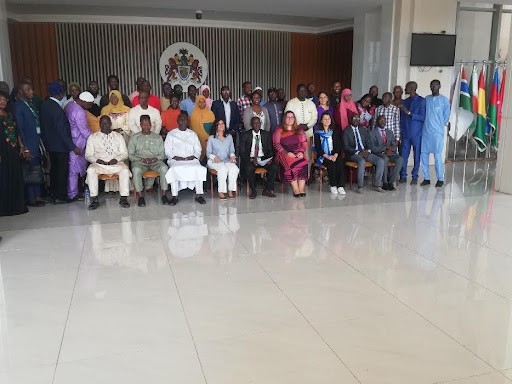By Madiba Singhateh
The National Environment Agency (NEA), serving as the GEF Operational Focal Point, convened an implementation meeting on Thursday, November 14, to kick start the preparation phase of the Climate Resilience Project on Enhancing Urban Resilience in the Greater Banjul Area (CLIMB). The initiative aims to lay a foundation for cohesive stakeholder collaboration to address the urban climate resilience challenges in The Gambia.
Funded by the Global Environment Facility’s (GEF) Least Developed Countries Fund (LDCF), the CLIMB project is a $12.5 million initiative requested by the Gambia Government through NEA, with support from the United Nations Environment Programme (UNEP). The project focuses on strengthening climate resilience in Greater Banjul Area (GBA) communities through urban ecosystem-based adaptation (EbA) solutions.
Atifa Kassam Manji, UNEP Project Manager, emphasized the project’s timely importance, noting the rapid urbanization across Africa, which reached nearly 45% in 2023. She highlighted the urgency of adaptation amidst insufficient emission mitigation efforts.
“The latest UNEP Adaptation Gap Report cites an annual $200 billion adaptation finance gap. Bridging this gap requires innovative approaches,” Manji stated.
She added that urban resilience necessitates multifaceted strategies, including integrated planning, cross-sectoral risk management, and hazard assessment.
Dawda Badjie, NEA Director, underscored the pressing vulnerabilities facing The Gambia’s coastal regions, particularly the GBA, due to climate change-induced flooding, erosion, and environmental degradation.
“Rapid urbanization has compounded the region’s vulnerability, exposing communities to rising sea levels and extreme weather events. This project aims to build climate resilience by scaling ecosystem-based adaptation investments and promoting sustainable urban planning,” Badjie remarked.
He further highlighted the Gambia Government’s unwavering commitment to environmental protection as a cornerstone of sustainable development. “Collaboration among all stakeholders is vital to ensuring the project aligns with national and global realities, particularly in urban settings,” he added.
The meeting also featured remarks from Momodou Kanyi of the Ministry of Environment and Sambou Nget of the UNDP. Both reiterated their institutions’ support for the project, recognizing its potential to drive transformative climate action in The Gambia.
In conclusion, Badjie extended gratitude to donor partners, including GEF and UNEP, and the consulting firm engaged in the project. He urged all stakeholders to contribute to its successful implementation, fostering long-term climate resilience and sustainable development for The Gambia.
The CLIMB project sets the stage for innovative, inclusive strategies to tackle urban climate challenges while enhancing the adaptive capacities of vulnerable communities in the Greater Banjul Area.



















